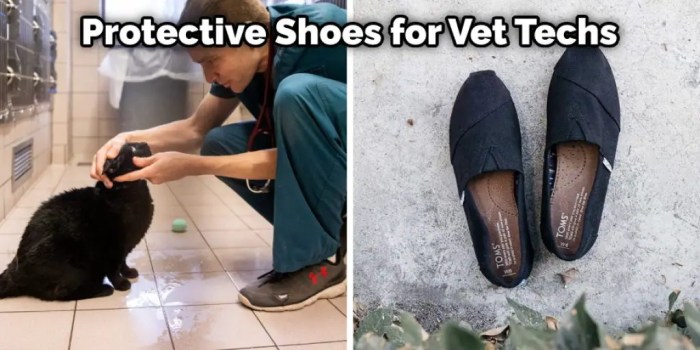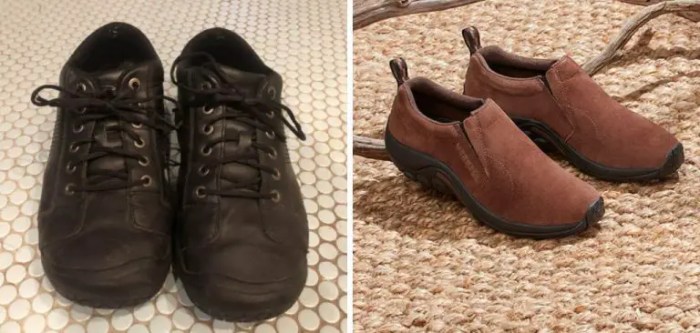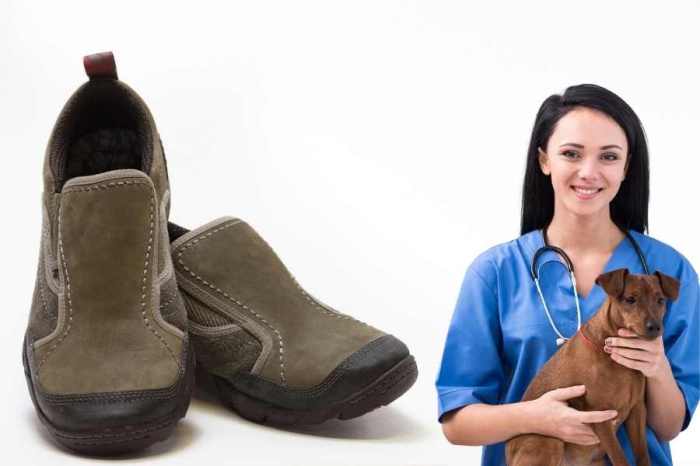Good shoes for vet techs – In the demanding field of veterinary medicine, selecting the right shoes is paramount for veterinary technicians (vet techs). Their daily routines involve長時間站立, navigating challenging environments, and providing exceptional care to animals. Understanding the specific needs of vet techs, this article delves into the essential features and considerations when choosing good shoes to ensure their comfort, safety, and well-being.
From slip-resistant soles to breathable materials, we explore the key characteristics of ideal vet tech shoes. Discover the different types of footwear suitable for this profession, including athletic shoes, clogs, boots, and safety shoes. We also provide recommendations for specific brands and models, highlighting their unique features and benefits.
Introduction to Good Shoes for Vet Techs

Vet techs spend long hours on their feet, often in demanding and challenging environments. Wearing comfortable and supportive shoes is crucial for their well-being and job performance.
Vet tech work environments present unique challenges, such as exposure to fluids, chemicals, and slippery surfaces. Good shoes should provide protection, traction, and stability to prevent accidents and injuries.
Good shoes for vet techs are essential for their daily routine, providing comfort and protection. They should consider the chemical composition of the products they use, such as cis 2 3 dibromo 2 hexene , and choose shoes that are resistant to these chemicals.
Additionally, good shoes should provide adequate arch support and cushioning to prevent fatigue and injuries.
Choosing the Right Shoes
When selecting shoes for vet techs, consider the following factors:
- Comfort:Shoes should provide ample cushioning and support for prolonged standing and walking.
- Protection:Shoes should have closed toes and be made of durable materials to protect against spills and punctures.
- Traction:Shoes should have slip-resistant soles to prevent falls on wet or slippery surfaces.
- Washability:Shoes should be easy to clean and disinfect to maintain hygiene in the clinic environment.
- Style:While comfort and functionality are paramount, shoes can also be stylish and complement the vet tech’s uniform.
Key Features of Good Shoes for Vet Techs
When selecting footwear for the demanding profession of veterinary technicians, it’s crucial to consider specific features that ensure comfort, safety, and functionality in the workplace. Here are some essential characteristics to look for:
Durability
Vet techs often encounter challenging work environments, so their shoes must withstand wear and tear. Look for shoes made from durable materials like leather or synthetic leather that can endure frequent use and cleaning.
Slip Resistance
Wet floors and slippery surfaces are common in veterinary clinics. Slip-resistant shoes provide stability and prevent falls, ensuring the safety of both the vet tech and the animals under their care.
Cushioning
Vet techs spend long hours on their feet, so cushioning is essential for comfort and support. Look for shoes with shock-absorbing insoles and arch support to minimize fatigue and discomfort.
Breathability, Good shoes for vet techs
Working in a veterinary clinic can be physically demanding, leading to sweaty feet. Breathable shoes allow air to circulate, keeping feet dry and preventing odors.
Waterproofing
Exposure to water and bodily fluids is common in veterinary settings. Waterproof shoes protect feet from moisture, preventing discomfort and potential health risks.
Types of Shoes Suitable for Vet Techs

Choosing the right type of shoes is essential for vet techs to ensure comfort, safety, and functionality in their demanding work environment.
Athletic Shoes
- Lightweight and breathable, providing comfort during long hours of standing and moving.
- Cushioning and support for the feet and ankles, reducing fatigue.
- Slip-resistant soles for stability on wet or slippery surfaces.
Clogs
- Closed-toe design with a wide opening for easy on and off.
- Durable and easy to clean, making them ideal for working with animals.
- Slip-resistant soles and arch support for comfort and stability.
Boots
- Provide protection from spills, animal bites, and other hazards.
- Waterproof and durable, suitable for outdoor work or wet environments.
- Slip-resistant soles and ankle support for safety and stability.
Safety Shoes
- Meet industry safety standards, such as those from ASTM or OSHA.
- Reinforced toes for protection from falling objects.
- Slip-resistant soles and puncture-resistant materials for added safety.
Brands and Models of Recommended Shoes

When choosing shoes for vet techs, consider brands and models that prioritize comfort, durability, and functionality. Here are some highly recommended options:
The following table provides a list of specific brands and models of shoes that are highly recommended for vet techs, along with their key features and benefits:
| Brand | Model | Features | Benefits |
|---|---|---|---|
| Dansko | XP 2.0 Clogs | Slip-resistant, roomy toe box, arch support, cushioned footbed | All-day comfort, protection from spills and liquids, support for long hours on your feet |
| Hokka One One | Bondi 8 | Maximum cushioning, rocker-shaped sole, breathable mesh upper | Exceptional shock absorption, reduced joint pain, promotes a natural gait |
| Merrell | Encore Gust Slip-On | Water-resistant, breathable leather upper, removable footbed, M Select GRIP outsole | Keeps feet dry and comfortable, provides arch support, excellent traction on various surfaces |
| Keen | Utility II Mid Waterproof | Waterproof, breathable membrane, supportive ankle, slip-resistant outsole | Protects against wet conditions, provides stability and protection, ensures secure footing |
| Crocs | Bistro Clogs | Lightweight, slip-resistant, antimicrobial, easy to clean | Comfortable for extended periods, prevents slips and falls, resists odors and bacteria |
Factors to Consider When Choosing Shoes

Choosing the right pair of shoes is crucial for vet techs who spend long hours on their feet in demanding work environments. Several key factors should be considered to ensure comfort, safety, and durability.
These factors include:
Fit and Comfort
Shoes should fit snugly but not tightly, providing adequate space for toes to move without causing discomfort or blisters. The heel should fit securely without slipping, and the insoles should provide sufficient cushioning and support for prolonged standing and walking.
Support and Cushioning
Good shoes for vet techs should offer proper arch support to prevent foot fatigue and strain. Cushioning in the soles helps absorb shock and reduce impact on the feet, joints, and back.
Slip Resistance
Slip-resistant soles are essential in veterinary clinics, where spills and wet surfaces are common. Shoes with rubber or other slip-resistant materials provide traction and stability, reducing the risk of slips and falls.
Durability
Vet techs need shoes that can withstand the rigors of their work environment. Durable shoes made of high-quality materials, such as leather or synthetic leather, can resist wear and tear and last longer.
Style and Appearance
While comfort and safety are paramount, vet techs may also prefer shoes that are stylish and professional. Many manufacturers offer shoes that combine functionality with a sleek and modern look.
Tips for Maintaining Vet Tech Shoes

Maintaining your vet tech shoes properly is crucial for extending their lifespan and performance. Here are some practical tips to help you care for your shoes effectively:
Regular cleaning is essential to remove dirt, debris, and bodily fluids that can accumulate on your shoes. Use a soft brush or cloth dampened with warm water and a mild soap solution to gently scrub the exterior of your shoes.
Avoid using harsh chemicals or abrasive cleaners, as they can damage the materials.
Storing Shoes Properly
When not in use, store your vet tech shoes in a dry, well-ventilated area. Avoid exposing them to extreme temperatures or direct sunlight, as this can cause the materials to deteriorate. If possible, use shoe trees or inserts to help maintain the shape of your shoes.
Repairing Shoes
Minor repairs, such as mending torn seams or replacing worn-out laces, can extend the lifespan of your vet tech shoes. If you notice any damage, address it promptly to prevent further deterioration. Consider seeking professional repair services for more extensive repairs, such as fixing broken soles or replacing zippers.
Conclusion

Choosing the right shoes is essential for vet techs to maintain comfort, safety, and productivity throughout their demanding workdays. By considering the key features discussed in this article, such as support, cushioning, slip resistance, and durability, vet techs can make informed decisions that will protect their feet and enhance their overall well-being.
It’s important to remember that every vet tech has unique needs and preferences. Further research and consultation with professionals, such as podiatrists or occupational health specialists, can provide personalized recommendations and ensure the best possible fit and comfort.
Q&A
What are the most important features to look for in vet tech shoes?
Durability, slip resistance, cushioning, breathability, and waterproofing are key features to consider.
What types of shoes are commonly worn by vet techs?
Athletic shoes, clogs, boots, and safety shoes are popular choices.
How often should vet techs replace their shoes?
Shoes should be replaced every 6-12 months or sooner if they show signs of wear and tear.